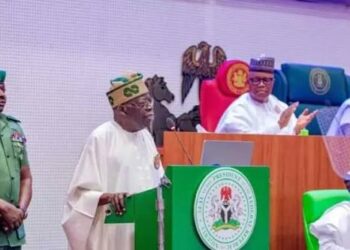The recent revelation of the staggeringly high 118.9 percent debt service/revenue ratio from January to April by Ahmed Zainab, Nigeria’s minister of finance may have given another dubious global ranking to Nigeria by the Economist Intelligence Unit (EIU)
Analysts at the EIU in a global note to investors on Wednesday said the it is unfortunate that this is happening even at the time of higher international oil prices.
The report said: “Nigeria’s federal government debt service payments in the first four months of 2022 totalled N1.9trn, which was greater than its total revenue of N1.6trn, according to the 2023‑2025 Medium-Term Expenditure Framework and Fiscal Strategy Paper (MTEF/FSP) draft presented by the finance, budget and national planning minister, Zainab Ahmed, on July 21st.
“It confirms that Nigeria’s fiscal position is untenable, despite high international oil prices. We consider both subsidy and tax reform as inevitable in the medium term.” On the back of this, the EIU said Nigeria’s deficit for 2022 could now be expected to top 6 percent of GDP.”
Nigeria already has the highest number of out of school children in the world and years ago, it was awarded the inglorious label of poverty capital of the world on account of its burgeoning population of absolute poor.
It added: “High global oil prices are not translating into government receipts because of an expensive petrol subsidy, which the government essentially buys from the national oil company in exchange for income from crude sales.
“The main issue is that Nigeria is under-producing oil. Output of 1.17m barrels/day (b/d) in June compares with sustainable capacity of 1.5m b/d and is being kept low by insecurity in oil‑producing areas, and theft and vandalism of infrastructure are huge problems.
“Markets have baulked at Nigeria’s fiscal pressures: credit default swap spreads have risen steadily since April (as the petrol subsidy bill began to spiral) and topped 1,000 basis points in late July—a spread not registered since the depths of the coronavirus pandemic shock in April 2020. Restricted access to the international capital market is forcing the Nigerian government to borrow domestically at high interest rates.
“At N3.1trn, the government deficit in January-April was almost double its income and stemmed from a 50.9% shortfall in revenue relative to budget, despite an underspend of 18.3%.
“The MTEF/FSP draft contains two scenarios for federal budget estimates for 2023. Under a scenario where petrol subsidies—estimated to cost N6.7trn for the whole of 2023—end mid‑year as planned, total spending would be N18trn, which is 3.9% more than the 2022 budget.
ALSO READ:Abaribe Condems Series Of Security Meetings In The Past Without Results, Defends Impeachment Threat
However, under a business-as-usual scenario without subsidy reform, expenditure is estimated at N17trn, which is 1.9% lower than the 2022 budget. In other words, not ending the subsidy would necessitate austerity in an economy where government spending accounts for just 6% of GDP.”












